新概念英语第一册第一课第二课解析
新概念第一册lesson1-2ppt课件
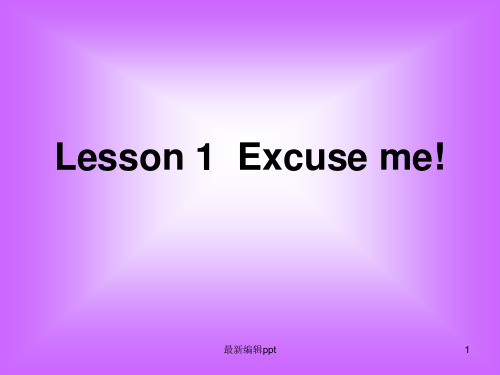
Excuse me.Can you tell me the way to the WC?
• 4)向某人借东西
Excuse me. Can I borrow your pen?
• 5)需要从别人身边挤过或让别人给自己让路
Excuse me. May I take some room for me?
最新编辑ppt
最新编辑ppt
57
•house 房子
eg. This is my house. Is this your house?
最新编辑ppt
58
Exercise A 翻译
1.这是我的连衣裙。 2.那是你的衬衫。 3.这是她的裙子。 4.那是你的小汽车。 5.这是你的手表吗?是的,它是。 6.那是你的钢笔吗?不,它不是。 7.这是你的手提包吗?是的,它是。
最新编辑ppt
35
在含有this/that的一般疑问句 中,如果this/that后接的是不 会说话名词的名词时,都用it 来代替.
最新编辑ppt
36
将下列句子变成一般疑问句,并作肯否定回答
1.This is my watch. Is this your watch?
Yes, it is.
No, it isn’t.
• 反义词/对应词
• that pron. 那
这是一支钢笔.
This is a pen.
那是一扇门.
That is a door.
最新编辑ppt
19
• your 你的,你们的
最新编辑ppt
20
your 你的,你们的 (物主代词)
• eg. your book That is your book. your room This is your room.
新概念英语第一册-第一课和第二课

4
new Words
excuse /iks`kju:z/ v. 原谅
me /mi:/ pron. 我(宾格) is /iz/ v. be 动词单数第三人称
yes /jes/ adv. 是的
this /ðis/ pron. 这 handbag / 'hæ ndbæ g/ n.
手提包
new words
• Be 动词 am is are • I am Cindy 主系表结构。只有I 的时候, be 动词用am • He is a boy; • This is a handbag • It is a dog. • is 用于单数 • They are boys. • We are good people. • are 用于复数
对不起,很抱歉。常用于做错事,或伤 害到别人,请求原谅,或听到不好的消 息表示遗憾。
~练习~(Exercise)
几种情况,分别应该用什么?
1.—I’m—s—orr—y . I broke your bike. 我把你的自行车弄坏了。
2.—Exc—us—e m—e. I have to speak to you. 我有话跟你说。
Lesson 1 Excuse me !
•
•
引言 上达学 提词综作崭短概法册新 学到完 升汇合;新文念打,概 期初新 。等技新的,二下第念 的中概 都能概语新是坚一英 水三念 会,念法概经实册语 平年英 有包四、念典的为一 。级语 一括是句三的基口共
和一 个阅英法是句础语分 高可 质读语和一型,和为 中以 的和的写些和新语
handbag n. (女用)手提包。这是一个合成
词,类似的词还有blackboard,homework等。
新概念英语第1册课文及详解知识分享

Lesson 1 Excuse me!对不起!Listen to the tape then answer this question. Whose handbag is it? 听录音,然后回答问题,这是谁的手袋?Excuse me!Yes?Is this your handbag?Pardon?Is this your handbag?Yes, it is.Thank you very much.New Word and expressions 生词和短语excuse v. 原谅This :pron.这me pron.我(宾格)your 你的,你们的is v. be 动词现在时第三人称单数Handbag n. (女用)手提包Pardon int. 原谅,请再说一遍It pron.它thank you 感谢你(们) very much 非常地be 的用法口诀我用am,你用are,is连着他,她,它;单数名词用is,复数名词全用are。
变疑问,往前提,句末问号莫丢弃。
变否定,更容易,be后not莫忘记。
疑问否定任你变,句首大写莫迟疑。
be动词专项练习--用am, is, are 填空:1. I ______ a student. ______ you a student? No, I _____ not.2. The girl______ Jack's sister.3. The dog _______ tall and fat.4. The man _______ a teacher.5. ______ your brother in the classroom?6. Where _____ your mother? She ______ at home.7. How _______ your father?8. Jane and Tom _________ my friends9. Where _____ my pen ?10. Where ______ my books ?11. That ______ my red skirt.12. Who ______ I?13. The jeans ______ on the desk.14. Here ______ a photo of my family .15. Here ______ some sweaters for you.句型转换的方法一.肯定句变否定句1.句子中有be,在be后加not。
新概念英语第一册Lesson 1~2语法归纳
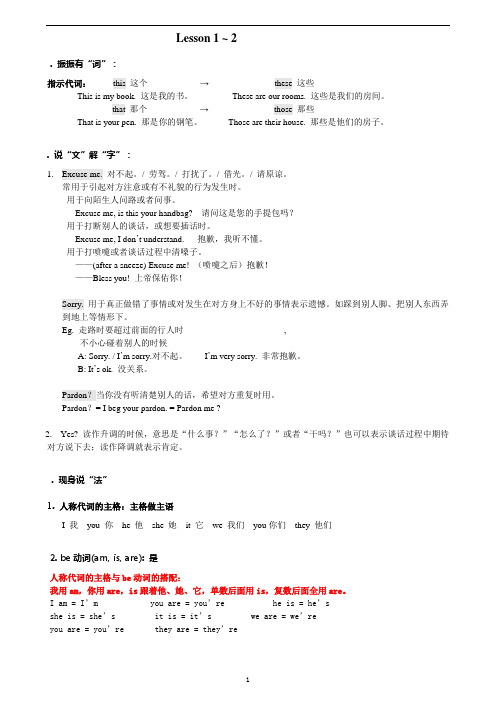
Lesson 1 ~ 2. 振振有“词”:指示代词:this 这个→these 这些This is my book. 这是我的书。
These are our rooms. 这些是我们的房间。
that 那个→those 那些That is your pen. 那是你的钢笔。
Those are their house. 那些是他们的房子。
. 说“文”解“字”:1.Excuse me. 对不起。
/ 劳驾。
/ 打扰了。
/ 借光。
/ 请原谅。
常用于引起对方注意或有不礼貌的行为发生时。
用于向陌生人问路或者问事。
Excuse me, is this your handbag? 请问这是您的手提包吗?用于打断别人的谈话,或想要插话时。
Excuse me, I don’t understand. 抱歉,我听不懂。
用于打喷嚏或者谈话过程中清嗓子。
——(after a sneeze) Excuse me! (喷嚏之后)抱歉!——Bless you! 上帝保佑你!Sorry. 用于真正做错了事情或对发生在对方身上不好的事情表示遗憾。
如踩到别人脚、把别人东西弄到地上等情形下。
Eg. 走路时要超过前面的行人时_______________________,不小心碰着别人的时候__________A: Sorry. / I’m sorry.对不起。
I’m very sorry. 非常抱歉。
B: It’s ok. 没关系。
Pardon?当你没有听清楚别人的话,希望对方重复时用。
Pardon?= I beg your pardon. = Pardon me ?2. Yes? 读作升调的时候,意思是“什么事?”“怎么了?”或者“干吗?”也可以表示谈话过程中期待对方说下去;读作降调就表示肯定。
. 现身说“法”1. 人称代词的主格:主格做主语I 我you 你he 他she 她it 它we 我们you你们they 他们2. be动词(am, is, are): 是人称代词的主格与be动词的搭配:我用am,你用are,is跟着他、她、它,单数后面用is,复数后面全用are。
新概念英语课程1-4解析
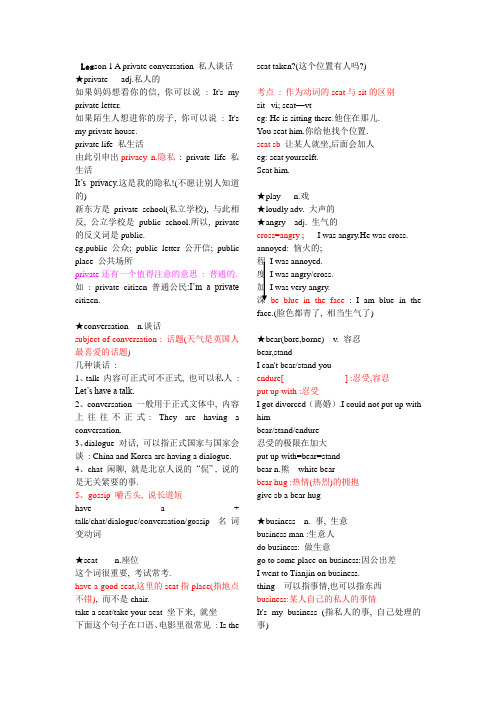
Les son 1 A private conversation 私人谈话★private adj.私人的如果妈妈想看你的信, 你可以说: It's my private letter.如果陌生人想进你的房子, 你可以说: It's my private house.private life 私生活由此引申出privacy n.隐私: private life 私生活It’s privacy.这是我的隐私!(不愿让别人知道的)新东方是private school(私立学校), 与此相反, 公立学校是public school.所以, private 的反义词是public.eg.public 公众; public letter 公开信; public place 公共场所private还有一个值得注意的意思: 普通的. 如: private citizen 普通公民:I’m a private citizen.★conversation n.谈话subject of conversation : 话题(天气是英国人最喜爱的话题)几种谈话:1、talk 内容可正式可不正式, 也可以私人: Let’s have a talk.2、conversation 一般用于正式文体中, 内容上往往不正式: They are having a conversation.3、dialogue 对话, 可以指正式国家与国家会谈: China and Korea are having a dialogue.4、chat 闲聊, 就是北京人说的“侃” , 说的是无关紧要的事.5、gossip 嚼舌头, 说长道短have a + talk/chat/dialogue/conversation/gossip 名词变动词★seat n.座位这个词很重要, 考试常考.have a good seat,这里的seat指place(指地点不错), 而不是chair.take a seat/take your seat 坐下来, 就坐下面这个句子在口语、电影里很常见: Is the seat taken?(这个位置有人吗?)考点: 作为动词的seat与sit的区别sit--vi; seat—vteg: He is sitting there.他住在那儿.You seat him.你给他找个位置.seat sb让某人就坐,后面会加人eg: seat yourselft.Seat him.★play n.戏★loudly adv. 大声的★angry adj. 生气的cross=angry ; I was angry.He was cross. annoyed: 恼火的;程I was annoyed.度I was angry/cross.加I was very angry.深be blue in the face: I am blue in the face.(脸色都青了, 相当生气了)★bear(bore,borne) v. 容忍bear,standI can't bear/stand youendure[] :忍受,容忍put up with :忍受I got divorced(离婚).I could not put up with himbear/stand/endure忍受的极限在加大put up with=bear=standbear n.熊white bearbear hug :热情(热烈)的拥抱give sb a bear hug★business n. 事, 生意business man :生意人do business: 做生意go to some place on business:因公出差I went to Tianjin on business.thing 可以指事情,也可以指东西business:某人自己的私人的事情It's my business (指私人的事, 自己处理的事)it's none of your business【课文讲解】go to the theatresee a film=go to the cinemago to the +地点表示去某地干嘛go to the doctor's 去看病go to the dairy 去牛奶店go to the + 人+ 's 表示去这个人开的店go to the butcher's 买肉go to school: 去上学go to church: 去做礼拜go to hospital(医院):去看病go to the Great Wallgo home; 跟home相连一定表示没有事情可做,回家休息I am at home 在家休息enjoy, enjoy oneself:玩的开心enjoy+sth :喜欢,从当中得到一种享受I like something very much./I love something.I enjoy the class.I enjoy the music.I enjoy the book.enjoy the dinner/film/progeam/gamewere sitting :当时正座在过去进行时态:过去的某个时间正在发生的动作一个故事的背景往往用进行时态描述I+be+v(ing)The girl was reading a book in the garden.A boy came to her.got :变得,表示一种变化,got angryI am/was angry 是一个事实I got angry:强调变化过程It is hot.It got hot.got取代be动词,got是一个半联系动词,可以直接加形容词turn round:转头not pay any attention = pay no attention表示注意,pay attention; 对什么加以注意,pay attention to sthnot any=no I could not bear it./you./the noise.I can't hear a word.2.如果时间和地点连在一起,先放地点,再放时间如果问何时何地,是一个固定搭配when and where(4)...ahead of : 在...前面(+时间、位置)(动态的行为)ahead of timeHe goes ahead of me.5 ______ did the writer feel? Angry.a.Whereb.Whyc.Howd.When(5) ...c...how ——对一个方式、状态提问特殊疑问词对后面的答案提问angry(adj)how(adv.)——对形容词、副词、介词短语提问where ——用介词,地点when ——用介词,时间why ——用because回答11 The writer could not bear it. He could not ______ it.a.carryb.sufferc.standd.lift(11)...suffer:遭受,忍受(精神或肉体上)+痛苦bear: 忍受=standI suffer the headache.He often suffers defeat.Lesson 2 Breakfast or lunch? 早餐还是午餐? ★until prep.直到直到...才; 直到...为止后面加(时间状语)从句,前面就是主句1) His father didn't die until he came back. (肯定)直到他回来,他爸爸才死.2) His father was alive until he came back. (否定)直到他回来为止,他爸爸都是活着的.到他回来这一点之前,没死: not die; 活的: 不加not.把until作为时间终止线从句的时间终点之前,这个动作做了还是没做?做了——肯定;没做——否定.For he ___A(C)___(wait) until it stopped raining.A. waitedB.didn't waitA.leaveB.leftC.didn't leaveI stay in bed until twelve o'clock.I didn't get up until 12 o'clock.★outside adv. 外面作状语He is waiting for me outside.It is cold outsid.ring(rang.rung) v.(铃、电话等)响(刺耳的) [注]这种响是刺耳的, 往往是提醒人做某事The telephone(door bell) is ringing.而风铃等响要用jinglejingle(bell): (铃儿) 响叮当给某人打电话: ring sb.Tomorrow I'll ring you.打电话(名) : give sb. a ringRemember to ring me/remember to give me a ring戒指(名词) n★aunt n.姑,姨,婶,舅妈(所有长一辈的女性都用这个称呼)与此相同, 男性则是uncle: 叔叔他们的孩子: cousin : 堂兄妹(不分男女) cousin的孩子: nephew : 外甥, niece : 外甥女[记: “捏死” ]★repeat v.重复【课文讲解】On Sundays: 所有的星期天,每逢星期天never: 从来不(可以直接用在动词前面)=not (变成否定句,前面一定要加助动词) I don't like her.=I never like her.因为是上个星期,所以时态不是一般现在时. look out of :朝窗外看out of是固定搭配从...里:from, out of dark: 天很黑What a day?What + a + n.——感叹句It is a terrible day.==> What a terrible day! what+a/an (+a.)+n.(+主语+谓语)What a terrible day!省略: 1.主、谓随时可省what a good girl (she is)!2.省形容词What a day! 有上下文和一定的语境, 才能省略形容词.just then: 就在那时It was my aunt Lucy.如果不知道对方性别, 可以用it取代Who are you?/Who is it ?just只会出现在“现在完成时”by trainby 直接加交通工具(不能有任何修饰词, 复数)如果加修饰词, 就要换掉by用in或onI go out by bus.若是两辆: I go out in/on two buses.I'm coming to see you. 我将要来看你.用come 的现在进行时态be coming 表示一般将来同样的用法还有: go,come,leave,arrive,land,meet,die,start,return ,join...前4个一定要记住天哪!英国人说Dear me!或My dear!美国人说: My god! [] ([]发啊的音)注意美英的发音不同.It’s one o’clock! 注意下划线要连读!【Key structures】关键句型本课的重点句型是现在进行和一般现在. Now,often and Always 表示现在和经常发生的动作Now——现在进行时(说话的当时正在发生, 现阶段正在发生)Often , Always——一般现在时"现阶段":I am working as a teacher.I do.../he does...I get up...一般现在时, 是一种习惯, 真理, 是过去, 现在和未来都会发生的事情.现在还在睡觉He is still sleeping.频率副词往往放在句子中间, 实义动词前, 非实义动词后如果既有实义动词又有非实义动词, 要放在两个之间.疑问句中副词往往放在主语后面.非实义动词: 1.系动词(be)2.助动词帮助动词构成时态的(do,does,will,shall,have,had,has)3.情态动词: (must,can,may) 除此之外都是实义动词.【Special Difficulties】难点What+a/an+a.+n.+主语+谓语What 对名词感叹【Multiple choice questions】多项选择题5.He doesn't get up early on Sundays. He gets up ______ .tetelyc.slowlyd.hardly5."not early"late(adj./adv.) lately(adv.)=recently(adv.)最近的, 近来的.how are you going lately? 最近一段时间身体还好吗?A8 He ______ out of the window and saw that it was raining.a.lookedb.sawc.remarkedd.watched8.Alook(vi.):表示看的动作; 后面一定要加介词see(vt.) : 表示看的结果; 后面直接加宾语watch : 表示观看; 后面直接加宾语, 但宾语一定是能够活动的东西look at pictures (对)watch pictures(错)11 Breakfast is the first ______ of the day.a.foodb.dinnerc.lunchd.meal11.Dlunch :中餐food :食物dinner:正餐一天中最丰盛的那顿饭, 可能是中餐, 也可能是晚餐, 但决不会是早餐. meal : 一顿饭频率副词,放在实义动词前, 非实义动词后; 如果即有实义动词又有非实义动词.要放在两个之间疑问句中副词往往放在主语的后面Lesson 3 Please Send Me a Card 请给我寄张明信片★send v. 寄, 送寄信: send a letter用法: send sth to sb/send sb sth类似的用法还有give,take,pass,read,sell... send/take children to school区别: take : 强调某人亲自送; take flowers to his wife 自己送send则是通过第三人去送, 如美国的校车send flowers to his wife 叫店里的人送postcard n. 明信片[注意]/t/和/k/前者失去爆破音★spoil(spoiled or spoilt) v. 使索然无味, 损坏(重点词)几种破坏:break: 打破; break the windows 打破玻璃damage: 破坏, 程度不一定很重destroy : 破坏, 彻底摧毁以上三个是指物理上的破坏, 而spoil主要指精神上spoil: 把东西的质量变得不好; 生活中不顺心的事;宠坏, 溺爱1、宠坏His parents spoiled the boy.2、毁了某人心情.This spoiled my day.What you said spoiled me.His arrival spoiled my hoilday.★museum n. 博物馆Palace Museum:故宫★public adj. 公共的这个词我们在第一课见过了, 基本用法和private一起记. 下面再说两点:public house简称pub : 酒吧; public place 公共场所in public:公开的; in private:私下里的(介词短语在英语中往往充当状语)Let’s have a conversation in private.让我们私下谈谈?★friendly adj. 友好的以-ly结尾是形容词, 同样的还有lovely adj. friendly单独用, 形容词, 一般做定语来用作为状语表示这个人做什么事情很友好, 用短语in a friendly waywaiter n. 服务员, 招待员waiter(男服务员), waitress(女服务员), 只出现在餐馆里领班: chief waiter商店里的店员: shop assistant其他公共场所的服务员:attendant★lend v. 借给lend to / lend sth.to sb/ lend sb.sth.借进: borrow: borrow from; 但borrow不能用borrow sb sth.★decision n. 决定v. decidemake a big/great dicision (重大/伟大, 更重大)★whole adj. 整个的all the... : all the day (the可省略)the whole.. : the whole day.all of后面如果加代词, 代词前面不需要修饰词一旦要加名词, 前面一定要加theall of us;all of the students ★single adj. 唯一的, 单一的反义词: double 双倍的【课文讲解】The baby spoilded my night.and 先后往往是对等的概念, but也是如此teach sb.sth.He teaches our English.(错)He teacher us English.(对)语言不可数, 所以要用a little Italian或a few words of ItalianI can speak a little English/a few words of Englishthink about/of 考虑, 思考, think of还可指想到think over:仔细考虑last summer里的last表示“上一个”last:表示“上一个” 或“最后一个” , 表示“最后一个” 时要加冠词the具体到一天及一天的早中晚都要用onI spend the whole day in my room.spend+时间+地点: 在什么地点我花费/度过了多少时间I spend three hours in the sea.I spend my weekend at my mother's.I spend three hours in the classroom everyday.I spend a lot of time in traffic jam.(交通堵塞) Review回顾:spoilsend/lend/teach sb.sth.send/lend/teach sth. to sb【Special Difficulties】难点双宾语: 直接宾语(表示动作结果)和间接宾语(动作目标)give sb.sth./give sth to sbsb: 间接宾语sth: 直接宾语间接宾语在后面时, 其前必须加to(对……而言)或for(为……而做)give a book to me. I buy a book for you take flowers to my wife.order soup for you.可以翻译为“给” 、“替” 、“为” 的, 就用for; 如果只能翻译为“给” 的, 就用to与for相连的buy,order,make,findfind sth.for sb.do sb.a favor 帮某人一个忙Do me a favor please./Do a favor for me.帮我一个忙What do you think of?What do you think of the weather today? 你觉得天气怎么样?cold,chilly,freeze, I'll freeze.我要冻僵了What do you think of TV program last night?send somebody somethingsend something to somebodygive, take, pass, read, sell, buyfind something for somebodymake buy Do a favor for me.Can I order something for you?【Multiple choice questions】多项选择题4 ______ him a few words of Italian? The waiter.a.Who taughtb.Who did teachc.What did he teachd.Whom did he teach找特殊疑问词的时候一定要根据答案来决定who whom人做主语提问——who 对宾语提问——whom如果对主语提问, 则句子的的语序和陈述句语序一样如果对非主语来提问, 则句子要使用特殊疑问词+一般疑问句的语序A 正确who既可以对主语提问也可以对宾语提问, 而whom只能对宾语提问Who/Whom did the waiter teach a few words of Italian?5 He was a friendly waiter. He spoke to the writer ______ .a.friendb.as friendsc.like friendsd.in a friendly wayHe spoke to the writer like a friend.in...way :以...方式D正确friendly单独用, 形容词, 一般做定语来用作为状语表示这个人做什么事情很友好, 用短语in a friendly way7 He spent the whole day in his room. He was in his room ______ day.a.the holeb.the allc.alld.all ofwhole all the day; all of usC正确all of 后面如果加代词, 代词前面不需要修修饰词一旦要加名词, 前面一定要加theall of the friends all of my friends all of the students10 On the last day he made a big decision. It was the ______ day of his holiday.a.finalb.endtestd.bottomthe last day, final——形容词end——名词/动词bottom——名词形容词修饰daylatest:最新的latest news latest style 新款11 He made a big decision. He ______ .a.thought about itb.made up his mind .changed his mind d.made a wish think about:考虑、思考、想make up one's mind:下定决心change one's mind:改变主意make a wish: 许个心愿, 愿望, 许愿B正确Lesson 4 An exciting trip 激动人心的旅行【New words and expressions】生词和短语★exciting adj. 令人兴奋的excite:激动excited:-ed: 自己感到/ -ing:令人感到exciting boy 令人兴奋的男孩interesting manThe man is interesting.The news exciting,I am excited这类动词的宾语一定是人The news excited me.让后面的人感到...interesting:令人感到有趣的interested: 感到有意思的The book interests me.那本事让我感到很有趣★receive v. 接受, 收到accept : 同意接收receive:客观的收到This morning I received a bunch of flowers from a boy,but I didn't accept it.take 也可以作收到take the exam : 接收考试; take advice接收建议receive/havereceive/have a letter from somebody.★firm n. 商行, 公司company★different adj. 不同的★centre n. 中心★abroad adv. 在国外副词, 直接和动词连用go aroad 去国外live abroad 国外定居study abroad 国外学习【课文讲解】读音语调要顿拙一些received a letter from just和完成时连用months one month[] two months[] 注意读音将//省略I'have arrived in Beijing. (has been)arrive 是瞬间动词不能和段时间连用He has been in Beijing for one year.has been + in 地点He has been in America for tow years.连读work for work in 强调地点work for 强调workI am working for a school.I am working in the New Oriental school. a great number of 类似于, 约等于a lot ofa great number of 后面一定要加可数名词复数a lot of 可加可数名词也可加不可数名词I have a lot of friendsI have a great number of friends.has gone to :去了某地没回来has been to :曾经去过某地, 现在不在那个地方find trip excitingfind +宾语+形容词做宾补find the room cleanis finding I'm finding... . . We’re finding... ...在口语中经常使用他到某地有多久了.He has been... ...I have been here for three years.find+n.+a.(宾补)【Multiple choice questions】多项选择题3 Tim is in Australia. He went ______ Australia six months ago.a.tob.inc.atd.intoat...表示位置be at...(典型表示位置的介词短语)go to...只要有to这个感念, 它的后面一定要有宾语, go to the theatergo in...(in 做副词)很少加宾语He went in.go into...有去向的动作, 还有进入的动作go into the roommove:搬家move in:搬进来move to the new house:正在搬move into :搬进去了4 Tim is in Australia. How long ______ there?a.is heb.has he beenc.has hed.was hehow long...对段时间提问, 跟现在完成时相连have+动词的过去分词。
新概念英语第一册第一课和第二课讲解
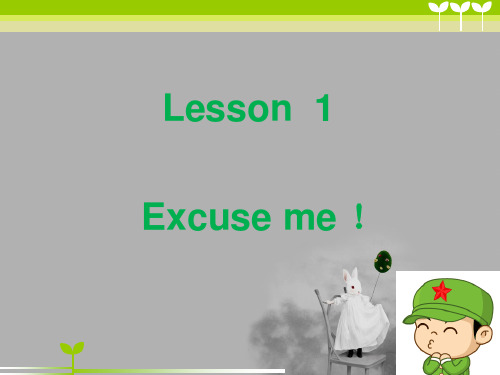
Game time
Answer the question.
Whose handbag is it?
New words and expressions
➢excuse v. 原谅
eg: Please ~ me for my being late. Can you ~ his fault?
➢me pron. 我(宾格)
➢yes adv. 是的
➢is v. be 动词第三人称单数
快速记忆:我(I)用am,你(you)用are, is用于他(he)、她(she)、它(it), 人称复数(we,they,you)全用are。
Your and you
• Your 形容词性物主代词(人称代词所有格) • Your handbag/ your mother/your books • 形容词性物主代词用在名词前面,相当于形容词放在名词前面。 • You 人称代词的主格 • 在句子中做主语 • You are my friend (你) • You are my friends(你们) • 人称代词主格在句子中作主语,上面的两个句式是主系表结构 • 系动词是 are • 系动词即be动词
pardon /'pɑ:dn/ int. 原谅,请再说一遍 I beg your pardon. it /it/ pron. 它,表示动物、天 气、时间、距离等无生命的东西。
thank you /θæŋk-ju:/ 感谢你(们)
very much / `veri-mʌtʃ / 非常
Game time
对不起,请再说一遍好吗?
➢it pron. 它(代替上文中出现过的单数名词)
➢thank you 谢谢你(你们)
➢very much 非常地。一般用于句尾,表示程
新概念英语第一册Lesson1~6课文翻译及学习笔记
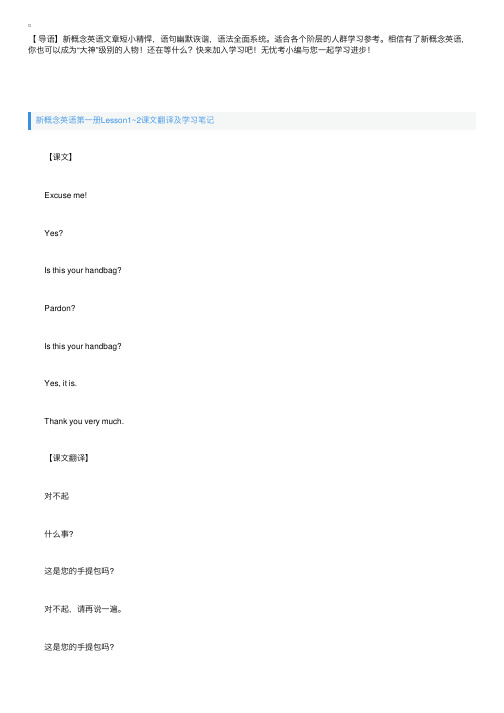
【导语】新概念英语⽂章短⼩精悍,语句幽默诙谐,语法全⾯系统。
适合各个阶层的⼈群学习参考。
相信有了新概念英语,你也可以成为“⼤神”级别的⼈物!还在等什么?快来加⼊学习吧!⽆忧考⼩编与您⼀起学习进步!新概念英语第⼀册Lesson1~2课⽂翻译及学习笔记 【课⽂】 Excuse me! Yes? Is this your handbag? Pardon? Is this your handbag? Yes, it is. Thank you very much. 【课⽂翻译】 对不起 什么事? 这是您的⼿提包吗? 对不起,请再说⼀遍。
这是您的⼿提包吗? 是的,是我的。
⾮常感谢! 【⽣词】 excuse v. 原谅 me pron.我(宾格) yes adv. 是的 is v. be 动词现在时第三⼈称单数 this pron.这 your adj. 你的,你们的 handbag n. (⼥⽤)⼿提包 pardon int. 原谅,请再说⼀遍 it pron.它 thank you 感谢你(们) very much ⾮常地 【知识点讲解】 1. Excuse me 是⼀个很常⽤的词组,通常⽤来引起对⽅注意或是搭话。
它的字⾯意思是“原谅+我”,但⼀般不⽤来跟⼈道歉,道歉还是应该⽤sorry。
2. ⽂中的yes有两种意思:其⼀是有⼈叫你时,回答对⽅;其⼆是表⽰肯定。
3. pardon本⾝也是“原谅”的意思,这⾥的意思是“不好意思我没有听清楚,请再说⼀遍”。
要对⽅重复,也可以说"Sorry?" 4. Is this your handbag? 这是你的⼿提包吗?这是疑问句的句型,变成叙述句应该是:This is your handbag. 这是你的包。
5. handbag,⼀般指⼥⽣⽤的⼿提包。
钱包是purse,男⽣的公⽂包是briefcase。
新概念英语第⼀册Lesson3~4课⽂翻译及学习笔记 【课⽂】 My coat and my umbrella please. Here is my ticket. Thank you, sir. Number five. Here's your umbrella and your coat. This is not my umbrella. Sorry sir. Is this your umbrella? No, it isn't. Is this it? Yes, it is. Thank you very much. 【课⽂翻译】 请把我的⼤⾐和伞拿给我。
新概念英语第一册第1-2课ppt
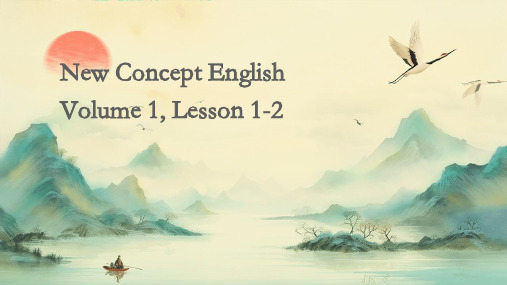
The adjectives describe the nature or quality of the learning or studying process.
Key Vocabulary for Lesson
Lesson 2 Vocabulary verbs: run, jump, swim, fly
02
The verbs listed are actions that involve movement or
activity.
The nouns listed are the settings or environments where
03
these actions typically take place.
04
情景教学
结合实际生活场景,模拟真实 对话情景,帮助学生更好地理
解和运用英语。
任务型教学
设计各种任务,让学生在完成 任务的过程中学习和运用英语
。
游戏化教学将英语学习融入来自戏中,让学 生在轻松愉快的氛围中学习英
语。
合作学习
鼓励学生分组合作,共同完成 任务,培养其合作精神。
02
Overview of New Concept English
What is the smallest country in the world?
05
Answer
06 The smallest country in the
world is Vatican City.
THANKS
stay home") and relative clauses (e.g., "The person who won the
prize was excited").
新概念课堂笔记 第一册 Lesson 1-2
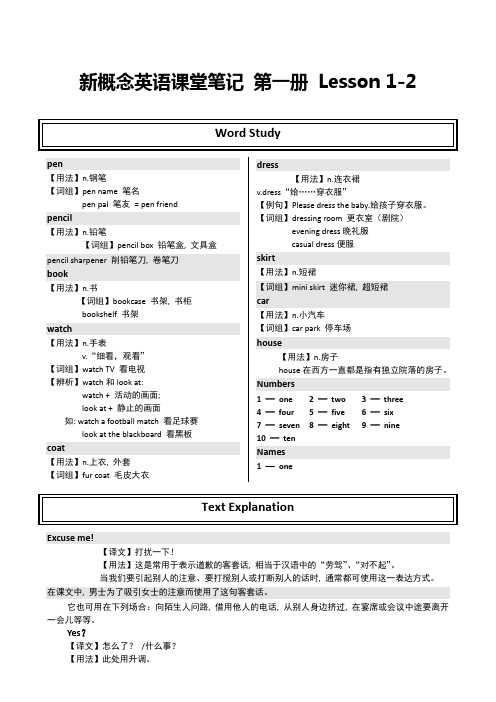
新概念英语课堂笔记第一册Lesson 1-2pen【用法】n.钢笔【词组】pen name 笔名pen pal 笔友= pen friendpencil【用法】n.铅笔【词组】pencil box 铅笔盒, 文具盒pencil sharpener 削铅笔刀, 卷笔刀book【用法】n.书【词组】bookcase 书架, 书柜bookshelf 书架watch【用法】n.手表v.“细看,观看”【词组】watch TV 看电视【辨析】watch和look at:watch + 活动的画面;look at + 静止的画面如: watch a football match 看足球赛look at the blackboard 看黑板coat【用法】n.上衣, 外套【词组】fur coat 毛皮大衣dress【用法】n.连衣裙v.dress“给……穿衣服”【例句】Please dress the baby.给孩子穿衣服。
【词组】dressing room 更衣室(剧院)evening dress晚礼服casual dress便服skirt【用法】n.短裙【词组】mini skirt 迷你裙, 超短裙car【用法】n.小汽车【词组】car park 停车场house【用法】n.房子house在西方一直都是指有独立院落的房子。
Numbers1 —one2 —two3 —three4 —four5 —five6 —six7 —seven 8 —eight 9 —nine10 —tenNames1 —oneExcuse me!【译文】打扰一下!【用法】这是常用于表示道歉的客套话, 相当于汉语中的“劳驾”、“对不起”。
当我们要引起别人的注意、要打搅别人或打断别人的话时, 通常都可使用这一表达方式。
在课文中, 男士为了吸引女士的注意而使用了这句客套话。
它也可用在下列场合:向陌生人问路, 借用他人的电话, 从别人身边挤过, 在宴席或会议中途要离开一会儿等等。
新概念第一册lesson1-2单词部分详解
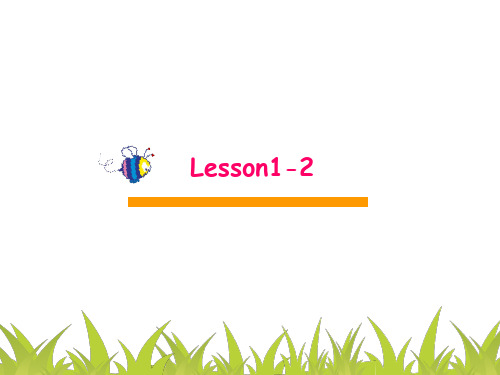
(15) watch n. 手表
skirt指的是半截裙,如mini-skirt. shirt指男士衬衫 女士衬衫叫blouse
(17) car n. 小汽车
(18) house n. 房子 housewife 家庭妇女 housework 家务 housekeeper 管家
你的,你们的
形容词性物主代词 我的 你的 他的 她的 它的 我们 的 my you r his her its our 你们 的 your 他/她/它 们的 their
⑺ handbag n. (女用)手提包
词汇扩展: 钱包 purse
(男用)公文包 briefcase
⑻ pardon int. 原谅,请再说一遍
Lesson1-2
1.excuse v.原谅
e.g. Excuse me 不好意思/打扰一下
2.me pron. 我(宾格)
I eat apple.
人称代词 主格 宾格
人称代词 主格 宾格
我
你
I
you
me
you
它
我们
it
we
it
us
他
她
he
she
him
her
你们
他/她/ 它们
you
they
you
缩写形式: I am = I’m You are = You’re He is = He’s She is = She’s It is = It’s We are = We’re You are = You’re They are = They’re
⑸ this pron. 这
e.g. This is my friend. 这是我的朋友。
新概念英语笔记第一册第1-2课

Lesson 1 Excuse me语音--前元音汉字属于象形文字,具有表义性英语属于拼音文字,具有表音性英语共有26个字母字母的发音规律:[ei]Aa Hh Jj Kk[i:]Bb Cc Dd Ee Gg Pp Tt Vv Zz[e]Ff Ll Mm Nn Ss Xx Zz(也可)[ai]Ii Yy[ju:]Qq Uu Ww[a:]Rr[əu]Oo元音字母: a,e,i,0,辅音字母:除 a,e,i,0,u以外的字母元音字母很少,只有5个,但却是字母的核心部分。
一个单词可以没有辅音却不能缺少元音字母。
例如:第一人称我”的主格:I。
音素是发音的最小单位,如:就是由几个音素组成的,音素的书面表现形式称为音标。
音标共48个,20个元音,28个辅音。
所谓元音,是指气流通过口腔时不受到发音器官的任何阻碍,所以发元音的时候一定要清晰、畅通。
元音:单元音、双元音单元音:前元音、中元音、后元音。
四个前元音,发音的主要器官,即舌的活动部位在口腔前部。
前元音: [i:] [i] [e] [æ]1. [i:]舌尖抵下齿,舌前部隆起,接近上齿龈,气流通过缝隙清晰地发出[i:][i:]――e在开音节中,读[i:],开音节指以元音结尾的词。
me-----我(宾格)he----他(主格)she----她(主格)we----我们(主格)be----系动词[i:]――eebee-----蜜蜂meet----见到street—街道keep----保持see-----看见[i:]―――eaeat-------吃meat------肉please----请read------读clean------干净的Read these sentences:Keep the street clean, please! 请保持街道清洁。
We eat meat every day. 我们每天都吃肉。
She meets me in the street every day. 她每天都在街上碰到我。
新概念第一册1-2课单词解析

6.your 你的(pron 代词)
•
7.handbag 手提包(n 名词) 合成词:football afternoon schoolbag
9. pardon
•1)n.(名词) 饶恕, 原谅
• I beg your pardon. •2)vt(及物动词)宽恕, 原谅,(表示礼貌时常 用的词语) • pardon sb (for doing) sth 原谅某人某事
情态动词(can will may)+主语+其他部分+?
• You can speak Chinese. • Can you speak Chinese? • Yes,I can No,I can’t.
助动词(do/does)+主语+其他部分+?
• You go to school everyday? • Do you go to school everyday? • Yes, I do . No, I don’t. • She likes swimming. • Does she like swimming?(动词一定要变原形) • Yes, She does. No, she doesn’t.
一般疑问句的用法:
• Be(am is are )+ 主语+其他部分+? • He is a student? • Is he a student? • Yes,it is. No it isn’t. • They are on the playground. • Are they on the playground? • Yes,they are. No,they aren’t.
新概念第一册1-2课单词解析
NC1A Unit 1
新概念英语第一册Lesson1-2 课文及讲义
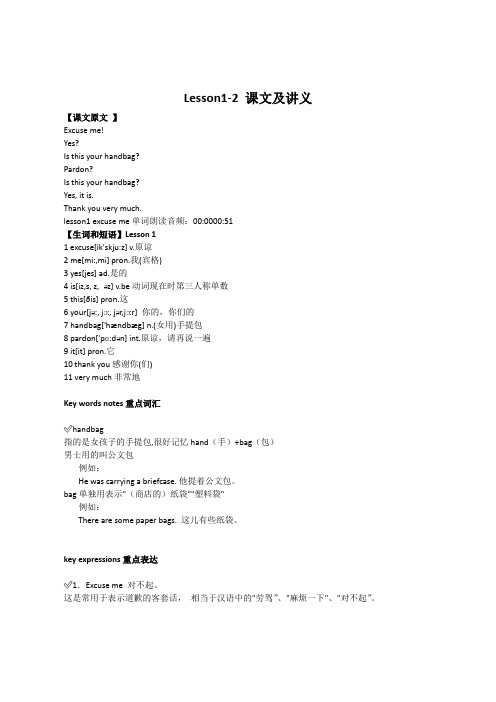
Lesson1-2 课文及讲义【课文原文】Excuse me!Yes?Is this your handbag?Pardon?Is this your handbag?Yes, it is.Thank you very much.lesson1 excuse me 单词朗读音频:00:0000:51【生词和短语】Lesson 11 excuse[ik'skju:z] v.原谅2 me[mi:,mi] pron.我(宾格)3 yes[jes] ad.是的4 is[iz,s, z, əz] v.be动词现在时第三人称单数5 this[ðis] pron.这6 your[jə:, jɔ:, jər,jɔ:r] 你的,你们的7 handbag['hændbæg] n.(女用)手提包8 pardon['pɑ:dən] int.原谅,请再说一遍9 it[it] pron.它10 thank you感谢你(们)11 very much非常地Key words notes重点词汇✅handbag指的是女孩子的手提包,很好记忆hand(手)+bag(包)男士用的叫公文包例如:He was carrying a briefcase. 他提着公文包。
bag单独用表示"(商店的)纸袋""塑料袋"例如:There are some paper bags. 这儿有些纸袋。
key expressions重点表达✅1.Excuse me 对不起。
这是常用于表示道歉的客套话,相当于汉语中的"劳驾”、"麻烦一下"、"对不起”。
➡️当我们要引起别人的注意、要打搅别人或打断别人的话时,通常都可使用这一表达方式。
在课文中,男士为了吸引女士的注意而使用了这句客容话。
它也可用在下列场合:向陌生人问路,借用他人的电话,从别人身边挤过,在宴席或会议中途要离开一会儿等等。
【推荐下载】英语语法干货分享-新概念第一册1-2课

英语语法干货分享|新概念第一册1-2课
沪江网校:新概念第一册知识点的总结和梳理,包括课文详解、语法要点以及重点
词汇的学习,绝对干货!
新概念英语一直是大家公认学英语的经典教材
很多同学觉得
新概念第一册学过了,很简单啊!
可是当你真的要用的时候
却发现学过的简单词汇,语法句式竟然用不上
1
[键入文字]
2
[键入文字]
当我们要引起别人的注意、要打搅别人或打断别人的话时,通常都可使用这一表达
方式。
在课文中,男士为了吸引女士的注意而使用了这句客套话。
它也可用在下列场合:
a、向陌生人问路,
b、借用他人的电话,
c、从别人?什么事?
3
[键入文字]
课文中的Yes?应用升调朗读,意为:什么事?
7
[键入文字]
答案
1、便服
2、晚礼服
3、小于英(上衣、裙子匹配的)西式女套装
想知道学好新概念是一种怎样的体验吗?
文章来源沪江社团
相关精华文章推荐》》》hujiang/c/xgn/list/
8
4.Thankyouverymuch.非常感谢!
4
[键入文字]
这是一句表示感谢的用语,意为非常感谢(你)。
请看下列类似的表达式,并注意其语气上的差异:
Thankyou.谢谢(你)。Thanks!谢谢!
5.数字1~10的英文写法
1one2two3three4four5five
6six7seven8eight9nine10ten
那只有一个原因,就是你没有学透!
酸梅汤老师的新概念英语第一册直播课已经正式上线了
所以,特此派我前来整理一些与新概念第一册有关的资料
新概念英语第1册第1-2课重点语法

新看法英语第 1 册第 1-2 课重点语法一、重要句型或语法1、指示代词 this的用法:1)This is/isn't a book/pen.2)Is this your handbag? Yes, it is. / No, it isn't.2、人称代词的用法1)主格(1)第一人称: I; we(2)第二人称: you; you(3)第三人称: he/she/it; they2)宾格(1)第一人称: me; us(2)第二人称: you; you(3)第三人称: him/her/it; them3、小编建议可补充指示代词 that 的用法。
this 表近指, that 表远指。
二、课文主要语言点1、Excuse me! :重视讲该短语用来搭话或打断或打扰别人时用。
2、Yes?:主要重视讲 yes 的语调是升调,用来表示说话者的疑问。
3、handbag:重视讲其构词方式为:hand+bag,( 女用 ) 手提包。
4、Pardon?:完满形式为“ I beg your pardon? ”,用来央求对方重复刚刚所说的话,口语中经常简单作“ Pardon?”。
5、Thank you :可介绍 thanks 和 cheers 等其他“感谢”的表达方式。
6、very much :表示“很,特别”。
提示孩子不要说“ very thank you ”。
三、双课补充内容识记单词: pen, pencil, book, watch, coat, dress, skirt,shirt, car, house 。
新概念英语1:Lesson1-2笔记分享

谓宾谓宾宾答答主主主系系系定定表表状1. excuse v.原谅 n.借⼝2. me pron. ⼈称代词,“我”的宾格,⽤作动词v.或介词prep.的宾语Excuse me 是客套话,常⽤于以下场景:1. 陌⽣⼈搭话,例如:向陌⽣⼈问路2. 打断别⼈说话,插话表示异议3. 从别⼈身边挤过4. 在某个宴会或会议中,中途离开5. 引起他⼈注意6. 道歉1. yes 应答,表示“怎么了,什么事?”= What’s up? = What’s the matter?yes adv. 是的,不错,有两种⽤法:1. Yes. 表肯定,读降调2. Yes?表不确定或询问,读升调,隐含让对⽅继续说下去的意思1. is v.是,be 动词现在时第三⼈称单数2. this pron. 单数指示代词,表示“这,这个”3. your pron. ⼈称代词,“你”的物主代词,表示“你的/ 你们的”4. handbag n. (⼥⽤)⼿提包 词根:hand n. ⼿;bag n. 包⼀般疑问句(Yes or No Question )[后⾯Grammar 部分重点详解]1. pardon n.(⽂中是名词) vt. 原谅,宽恕 n. 原谅,赦免,宽恕,特赦= Sorry. = Excuse me. = Say it again.较正式的说法有:1. I beg your pardon?2. I beg your pardon.3. Pardon me.1. it pron. ⼈称代词,“它”,第三⼈称单数主格Yes, it is. 是对⼀般疑问句的肯定回答;否定回答:No, it isn’t. (isn’t = is not)1. thank vi. 感谢 n. 感谢,谢谢,致谢Tips :“thank” 作名词, 表“感谢”,常作复数“thanks”2. very adv. 很,⾮常3. much adj. 真正的,实⾜的Thank you very much.= Thanks.= Thanks a lot.= Many thanks.也可以简单地说“Thank you.”针对感谢的答语:1. Not at all. 没关系。
- 1、下载文档前请自行甄别文档内容的完整性,平台不提供额外的编辑、内容补充、找答案等附加服务。
- 2、"仅部分预览"的文档,不可在线预览部分如存在完整性等问题,可反馈申请退款(可完整预览的文档不适用该条件!)。
- 3、如文档侵犯您的权益,请联系客服反馈,我们会尽快为您处理(人工客服工作时间:9:00-18:30)。
3. 我身体很好。
I am fine.
4. 他是一个医生。
He is a doctor.
5. 他们身体很好。
They are fine.
• 6. 你是一个男孩。
You are a boy.
• 7. 她是一个女孩。
She is a girl.
• 8. 它是一只可爱的 小狗。
It is a lovely dog.
handbag shirt
watch
pardon coat house
Is this a basketball ?
Yes ,it is.
Lesson1 Excuse me!
❖ : Look at the pictures ❖Listen to the teacher then answer
the question: ❖Whose handbag is it? ❖ It's the woman's.
• 5. I __a_m____ at school. • 6. He ____i_s___ at school.
•
• 7. We(我们) ____a_r_e__ students.
• 8. They(他们) ___a_r_e___ from China.
• 9. Yang Ling ____i_s___ eleven years old. • 10. Where ____a_r_e__ your friends? • 11. How old _____a_r_e___ you last year? • 12. Which dog(狗) ____i_s___ yours?
We are= We’re It is= It’s
They are= They’re
否定形式的缩写: is notm=jmisn’t are not= aren’t
am not没有缩写形式!
Learn the new words
excuse /iks’kju:z/ v. 原谅 me /mi:/ pron. 我(宾格)
请小组讨论完成下列练习
• 1.He _is__ Frank. • 2.She _i_s_ Helen. • 3.Bob and Frank _a_r_e boys(男孩). • 4.They(他们)a_r_e_ Eric and Gina. • 5.I a_m_ a beautiful girl.
is /iz/ yes /jes/ this /ðis/
v. be 动词第三人称单数 adv. 是的 pron. 这 {近},that 那个{远}
your /jɔ:/ 你的,你们的 pardon /'pɑ:dn/ int. 原谅,请再说一遍
it /it/ pron. 它
thank you /θæŋk-ju:/ 感谢你(们)
handbag /’hæ ndbæ g / 女用(手提包)
pardon /’pa:dn/
原谅,请再说一遍
watch /wɔtʃ /
手表
coat
/kəut/
大衣,外套
dress /dres/
连衣裙
skirt
/skЗ:t/
裙子
shirt
/ ʃЗ:t/
衬衣
house /haʊs/
房子
cards
闪卡
excuse dress skirt
very much / ‘ veri-mʌtʃ / 非常地
handbag [hæ ndbæ g]
[ˈpensl] pencil
house
[haʊs]
watch
[wɒtʃ]
shirt [ʃɜ:t]
coat [kəʊt]
dress [dres]
Learn the new words
excuse /ɪks’kju:z/ 原谅
I ( ) a boy. You ( ) a teacher. She ( ) a student(学生). It ( ) a cat. We ( ) girls. You ( ) teachers. They ( ) students.
1. 我是一个学生。
2I.a我m12a岁s。tudent.
• be动词用法歌: • 我用am,你用are,is跟着他,她,它。 • 单数名词用is,复数are。 • 变疑问,往前提,句末问号莫丢弃。 • 变否定,更容易,be后not莫忘记。 • 疑问否定任你变,句首大写莫迟疑。
be动r词fre的f 缩写来自I am= I’mYou are=You’re
He is= He’s She is= She’s
Let’s read and translate
Excuse me! 我 :主格 I
人称代词小歌谣:
我是I,你是you,
男他he,女她she, 物它就用it替, 我们we,你们you, 他她们they。
1.________(我) am a teacher. 2._______(你们) often read English. 3._______(他) often plays basketball after
is用于他(he),她(she),它 (it); 单数is,复数are。
mjm
• 1) I _a_m___ a student. • 2) You _a_r_e_ a doctor. • 3) she __is__ from Jinan.
• 4)He __is___ in Class 4, Grade 1. • 5) It __i_s __ a car.
school. 4._______(我们) buy a pair of shoes for
him. 5._______(他们) are listening to the radio. 6._______(她) likes to send food him.
rfref
• Be的用法口诀
我(I)用am ,你(you)用are;
• 二、在下面的题目中填上恰当的Be动词。
• 1. I __a_m_____from Australia.
• 2. She __i_s____ a student.
• 3. Jane and Tom ___a__r_e___my friends. 4. My parents(父母) _a_r_e_ very busy every day.
